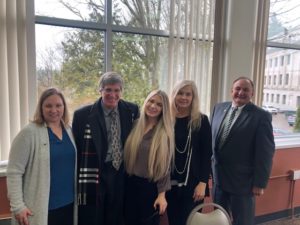Recently, the CEO of the National Alliance to End Homelessness, Nan Roman, shared the three elements she’s observed in communities that have successfully ended homelessness: data, funding, and buy-in from political leadership. Throughout the year, we work hard to make sure communities around the state have all three of these elements. During the legislative session, we are zoned in on securing state funding that goes towards effective solutions and working alongside elected officials who support policies that benefit young people.

The 2019 legislative session was full of victories for the movement to end youth and young adult homelessness. The state budget included $8.5 million for the Office of Homeless Youth, which included $4 million for the Anchor Community Initiative. We saw important policy changes, like the end of juvenile detention for status offenses and the requirement that no public system of care discharges young people into homelessness.
In 2020, we return to Olympia to advocate for:
· The Centralized Diversion Fund (CDF) – Our goal has always been to increase communities’ capacity, so when a young person says “Yes, I need help,” their community can say “Yes, we can help.” The CDF is a flexible fund that organizations around the state can access to help young people stay housed, whether that means helping meet a deposit on an apartment or helping with a car repair to help a young person stay employed and make their rent. To ensure the CDF launches with ample funds to support communities, we will advocate for our legislators to include $500,000 towards the CDF in the state budget.
· Protecting Commercially Sexually Exploited Children (CSEC) – Young people in the foster care system make up a high percentage of CSEC. We will advocate for the creation of two receiving centers to help CSEC receive treatment and return to their communities, and to keep youth from facing criminal prostitution charges.
· Family Reunification Services Program – When families receive the support they need before they become involved in systems like child welfare or juvenile justice, we strengthen families and prevent homelessness. We will advocate for increased capacity and expertise in culturally relevant prevention and early intervention services.
· Behavioral Health Funding – Our 2018 study found that 1,200 young people experienced homelessness within 12 months of exiting inpatient behavioral health treatment that year. We will advocate for funding to ensure that young people exiting treatment have safe housing and follow-up care.
· Extending Children’s Mental Health Workgroup (CMHWG) – The CMHWG advises the legislature on improving behavioral health services and strategies for children, youth, young adults and their families. The work group has identified barriers and opportunities to ensure these services are accessible, effective, timely, culturally and linguistically relevant and supported by evidence. The group sunsets in 2020; based on its proven efficacy and leadership we will advocate to extend its lifespan.
In addition, we will keep advocating for the necessary budget to successfully implement the policies passed in 2019. We will also support our partners’ legislative priorities, like the Office of Homeless Youth’s request for housing for minors and The Mockingbird Society’s work to help youth and young adults experiencing homelessness access IDs.
We are deeply appreciative of all our supporters who contacted their elected officials in 2019 and urged them to champion the needs of young people. Sign up to our email alerts to stay up to date on all our advocacy actions!

Leave a Reply